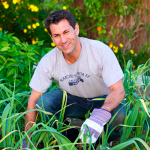Thanksgiving Edition: Teaching Kids to be Thankful & Caring
 As strange as it may seem, children are not born automatically to care about others. In fact, because humans are the only form of animal that is fully dependent on their caregivers at birth, it is only after a child takes in what it means to be cared for from the outside, that they can return the favor later in their lives. Children who do not receive enough early caring, both physically and psychologically, never even develop this capacity and remain self-centered for their lifetime unless they figure out that something really went wrong in the early years of their lives and dedicate themselves to “fixing” what was never there. For those who did receive the early nurturing fuel from their parents, they develop the capacity to care for others. But, even these children who have what it takes to care for others, must be led by adults who believe caring for others is an important virtue.
As strange as it may seem, children are not born automatically to care about others. In fact, because humans are the only form of animal that is fully dependent on their caregivers at birth, it is only after a child takes in what it means to be cared for from the outside, that they can return the favor later in their lives. Children who do not receive enough early caring, both physically and psychologically, never even develop this capacity and remain self-centered for their lifetime unless they figure out that something really went wrong in the early years of their lives and dedicate themselves to “fixing” what was never there. For those who did receive the early nurturing fuel from their parents, they develop the capacity to care for others. But, even these children who have what it takes to care for others, must be led by adults who believe caring for others is an important virtue.
“Kids must be taught to care by both watching and being encouraged to do so.”
Learning is almost always done by observing or listening to others. Children who have not been led, never become leaders themselves. Each person has a certain amount of what is takes to become a giver, but depending upon their environment, the end result will either be actualized or never utilized. Children are normally not able to “put themselves in the minds of others” before five years of age due to both neurological and developmental milestones, and even then, the process is gradual and varies in the depth of understanding the lives of others. Only until adolescence can a child utilize abstract reasoning which allows them to look ahead and in the past allowing for the considering of a life outside of theirs. But, what really shapes, and enhances the process of giving to others, is the influence of important people in the child’s life encouraging the process and leading the child into the rewards of giving that these adults have experienced as well.
“Kids caring together in groups with families strengthens the function.”
The earlier a child is encouraged, the greater giving to others will become a life-long process. But, aside from the importance of watching their families give, is the experience of their peers giving as well, and this is just as important as the influence of one’s family. We all know how peers in a child’s life become increasingly influential over time and how sometimes the influence of a peer will temporarily replace the parental position as a child needs to separate from mom and dad in order to be their own person and uses their peers to do so. However, if one’s peers are similar in character to one’s parents, then the child may not need to differentiate as much to feel independent. In other words, kids who pick kids who have similar characteristics as one’s parents often keep certain values consistent over time.
“Adults and Kids who care are considered healthy, whereas those who don’t are not.”
Caring for someone other than just yourself is a sign of a healthy person. In fact, the more a person is aware of another, the deeper and closer relationships can become. People who volunteer for example demonstrate more of the trait of altruism than people who don’t. People who help other people also feel better about themselves. Caring for others is truly a win-win but many never experience this part of life and they miss out on the opportunity to do something both personally rewarding yet also helpful to others. Given currents conditions of a struggling economy more people are suffering than ever before. The time is greater than ever to encourage people to care about themselves but also to care for others as well, especially with Thanksgiving and the winter holidays right around the corner.
______________________________________________________________
Dr. Keith Kanner is a Licensed and Board Certified Clinical Child, Adolescent, and Adult Psychologist and Psychoanalyst. In addition to a full-time private practice in Rancho Santa Fe, California, he is an Assistant Clinical Professor of Psychiatry in the School of Medicine at the University of California San Diego where he teaches both human development and also trains medical students how to better understand and relate to their patients. He also serves as the Director of Clinical Counseling for La Jolla Country Day School in La Jolla, California, and is a Clinical Professor at The San Diego Psychoanalytic Society and Institute. Dr. Kanner also sits on the National Board of Directors for Kids Korps USA, which is the largest organization in the country that teaches children and adolescents the importance of volunteering to help the community at large. As a father of three children, he is also a dedicated baseball, football, and soccer coach.










You must be logged in to post a comment Login